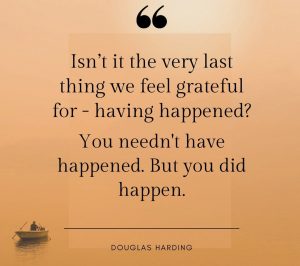《自律養生實踐家之旅323》 你發生了

「這難道不是我們最後才會感到感激的事嗎?那件事「發生了」,你本來可以不曾發生,但你發生了。」
反覆咀嚼哲學家道格拉斯・哈丁(Douglas Harding)的這句話,我逐漸理解其中的核心在於「人身難得」。在人生這場充滿未知的劇本中,我們最終能夠覺察這個「發生」是值得深深感恩的奇蹟。這句話彷彿是對我們「最常忽略、最不珍惜」的曾經,給出最深刻的回應。
長大,就是逐步邁向那個「終極的確定性」;可惜,那往往不是多數人的目標。除了慶幸自己還活著,我們很少真正意識到,自己其實是地球上獨一無二的珍寶。
當人生正要開始時,卻猛然發現已接近尾聲。我深信,每一位年長者都曾有這樣的驚覺。
我們究竟是如何荒廢人生的?我們在自私中成長,也在自大的過程裡耗盡了大半光陰。要看清這些生命軌跡背後的人性,常需半世紀的碰撞與體悟。
這是一段必須獨自承受的旅程,無論前人如何提醒,無論修行者怎麼提示,最終都得回歸自己的親眼所見和親身領受,那是屬於自己的唯一真實。
當一件事「發生了」,它就成為人生的一段經歷。在人生的旅途中,發生了就要面對,發生了就得接納。某一刻突然領悟到過往的錯失,那一刻,生命蘊藏著深意。
每個人都有機會經歷這樣的時刻,有些人即時就明白,有些人則需要被提醒:人生旅途,我們既有權利珍惜,也有義務珍惜。
分享我自己的那一刻,我不再苛責曾經蹉跎的自己,卻明白生命必須投注時間成長。我不再責怪曾經沉溺於物慾的自己,卻能坦然接受這一切是生命教我自省的方式。
錯過與珍惜從來沒有交集,我對養生的覺醒與錯過的感嘆,得回溯到每日三餐的過去,那時我還沒準備好接受提醒,也沒有覺悟。
每一次自我反思,都讓我更了解自己的處境。既然過去無法改寫,就得釋懷。真正體會「身體意識」之後,決定拋棄那些曾被食物牽制的愚昧過往。
正是在那個片刻,「人生苦短」這句話成了我深刻的印記,在這短暫的旅程中,無知與無明不應佔據主場,我卻得果斷告訴自己「既往不咎」。
當領悟浮現,珍惜就發生了。此後的每一次自我審視,都是在「必須處理的事」與「有意義的事」之間,尋求取捨與平衡。
而當這兩者重疊時,也正是「你發生了」這句話最聚焦的時刻。我們曾經模糊於自身的存在與價值,直到從孩子的身上,看見自己的一部分倒映。
當孩子還小時,父母究竟教了什麼?在孩子身邊談了什麼?做了什麼?父母是希望孩子功成名就,還是希望他懂得珍惜生命?
我們都記得父母和學校曾反覆叮嚀的話語,但進入職場之後,究竟還記得哪些?又是哪些人、哪句話真正影響了我們的一生?
人們之所以留存在他人記憶中,幾乎都與「做了什麼有意義的事」有關,而非「說了什麼話」。
為何我們總是重視孩子的成就與財富,而很少在身教中示範真正有意義的事?
真正有意義的事,從來不是對自己有利的事。將利益視為目的,正是人生庸碌空轉的原因。我們唯有穿越層層磨難,才能領悟那場關於「意義」的當頭棒喝。
哲學家約翰・羅爾斯(John Rawls)說過:「凡是蒙上天眷顧之人,無論他是誰,都必須協助那些身處劣勢的人,才能真正從自己的幸運中受益。」
我對「珍惜生命」的認真思考,是從體會身體天賦開始的。「飲水思源」的自我要求,也是在確定健康方向之後,才深深紮根。
那是一種極其稀有的機會,一場極為珍貴的相遇。透過尊重身體的練習,生命最終引我進入「人身難得」的深層領悟。
即便只是肚子餓了想吃,也是一次在「必須處理」與「是否有意義」之間的選擇。經過反覆練習後,「該吃」與「其實不必這樣吃」之間的判斷,自然清晰。
我們往往在誘惑面前忽略了身體的負荷,也忘了自己的存在。人從「被發生」開始,直到對「珍惜」產生深刻覺悟,最終會明白:健康,其實就藏在這些是否珍惜的日常細節裡。
(這難道不是我們最後才會感到感激的事嗎?那件事「發生了」,你本來可以不曾發生,但你發生了。)
You Did Happen
“Isn’t it the very last thing we feel grateful for – having happened? You needn’t have happened. But you did happen.”
This quote by philosopher Douglas Harding has lingered in my mind. After much reflection, I began to grasp its core: the rarity of being born human. In this unpredictable script we call life, the sheer fact that we happened—that we exist—is a miracle worthy of deep gratitude. Harding’s words feel like a profound reply to the part of life we most often neglect, the part we take most for granted.
To grow up is to move gradually toward the “final certainty.” Sadly, that certainty is seldom our actual goal. Other than feeling lucky to still be alive, we rarely realize we are rare, irreplaceable treasures on this Earth.
Just as life seems to be beginning, we are suddenly faced with its nearing end. I am deeply convinced that every elder has, at some point, been struck by this realization.
So how do we end up squandering life? We grow within selfishness, and lose much of our time to the arrogance of self-importance. To see the humanity behind these trajectories often takes decades of collisions and awakenings.
It is a path one must walk alone. No matter how earnestly the wise may warn us, no matter how often the spiritual call out to us, in the end, it is our own eyes and our own direct experience that reveal truth. And that truth is uniquely ours.
When something happens, it becomes a part of our life. On the journey of living, once it happens, we must face it. Once it happens, we must accept it. There comes a moment, sometimes sudden, when past mistakes become clear—and in that moment, life reveals its deeper meaning.
Everyone has the chance to experience such a moment. Some recognize it instantly; others need to be reminded: in the journey of life, we not only have the right to cherish—we have the duty to.
When it happened to me, I no longer resented the time I had lost. I came to understand that life requires time to grow. I no longer blamed my past indulgence in material desires. Instead, I could peacefully accept it as life’s way of teaching me reflection.
There is no intersection between regret and appreciation. My awakening to well-being, and my sorrow over all I had missed, can be traced back to those countless meals I consumed mindlessly. Back then, I wasn’t ready to listen. I hadn’t yet awakened.
Each time I reflect, I understand more about my own position in life. Since the past cannot be rewritten, it must be released. Once I truly understood what it meant to be embodied, I made the decision to let go of those ignorant years of being ruled by food.
It was in that moment that the phrase “life is short” became etched in me. In this fleeting journey, ignorance and unconsciousness should not reign. And I had to decisively tell myself: Let the past be the past.
When realization dawns, appreciation begins. From that point on, every self-inventory became a balancing act between “what must be done” and “what is meaningful.”
When those two overlap—that is when the phrase “you did happen” becomes most potent. We once blurred through our own existence, unsure of our value, until one day we saw part of ourselves reflected in our children.
When our children were young, what did we teach them? What did we say and do around them? Did we want them to be rich and successful—or did we want them to know how to treasure life?
We still remember the words our parents and teachers repeated to us. But once we entered the workforce, how many of those words truly remained? And who, or what, actually shaped the course of our lives?
People are remembered not for what they said, but for the meaningful things they did.
So why do we focus so much on our children’s achievements and wealth, yet so seldom model lives of meaning?
What’s truly meaningful is rarely what benefits the self. Seeing personal gain as life’s purpose is the very reason we run in circles, living meaningless lives. Only by passing through hardship do we wake up to the lesson life shouts at us about meaning.
Philosopher John Rawls once said: “Those who have been favored by fortune, no matter who they are, must help those less fortunate if they are to fully benefit from their own luck.”
My deep reflection on treasuring life began with recognizing the body’s innate wisdom. The demand I placed on myself to “remember the source when drinking water” only took root after I truly understood the path to health.
It was a rare opportunity. A precious encounter. Through the practice of honoring the body, life eventually led me to a profound realization of the rarity of human birth.
Even the simple act of hunger—wanting to eat—becomes a choice between what must be done and what is meaningful. Through repeated practice, the ability to discern between “I need to eat” and “I don’t need to eat like this” becomes second nature.
In the face of temptation, we often ignore the body’s burdens. We forget our very existence.
But from the moment we happened, to the awakening of true appreciation, we ultimately come to see:
Health is hidden in the everyday details of what we choose to cherish—or not.


